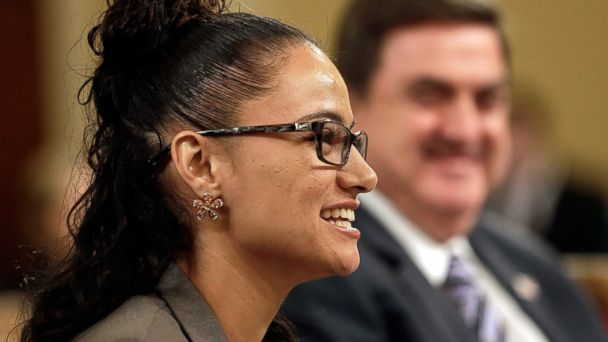Foster Care and Sex Trafficking Survivor Testifies on Hill

Win McNamee/Getty Images
This afternoon on the Hill a 24-year-old college student and sex trafficking survivor, Withelma "T" Ortiz Walker Pettigrew, shared her experiences growing up in the U.S., where she was used for money in the foster care system and ultimately forced into sex trafficking.
"I spent for the most part, the first 18 years of my life in the foster care system. Seven of those years I was a child being sexually trafficked on the streets, internet, strip clubs, massage parlors and even in the back of express papers," Ortiz Walker Pettigrew said in her written testimony before the House Committee on Ways and Means's Subcommittee on Human Resources.
Now, she has dedicated herself to sharing her story in hopes of helping young people and changing the system she grew up in for the better.
Since the early 1960s, the federal government has reimbursed states for part of the cost of providing foster care to children from needy families. In FY 2012, the federal government provided states $4.2 billion to support monthly payments to foster parents, case management, staff training and data collection. The goal of this funding is to ensure that foster parents can support children from needy families when the child cannot safely remain at home.
But according to Ortiz Walker Pettigrew, this is not always the case. Instead, the funding intended is often used for the foster parents' benefits, thereby teaching youth in the system that they are just a means for financial gain.
"These caregivers will make statements like, You're not my child, I don't care what's going on with you, as long as you're not dead, I'll continue to get my paycheck," Ortiz Walker Pettigrew explained in her written testimony. "This nothing-but-a-paycheck theory objectifies the youth, and the youth begin to normalize the perception that their presence is to be used for financial gain."
Consequently, it's not far from the foster home to the streets, making youth in the system easily susceptible to sex trafficking.
"When youth are approached by traffickers, pimps, exploiters, they don't see much difference between their purpose of bringing finances into their foster home and bringing money to traffickers, pimps, exploiters' stable," Ortiz Walker Pettigrew noted in her written testimony.
Statistics also support her claims. In 2010, officials in Los Angeles reported that 59 percent of juveniles arrested for prostitution were in the foster care system. In addition, the National Center for Missing and Exploited Children reported that of the children who are reported missing, who are also likely sex trafficking victims, 60 percent were in foster care or group homes when they ran away.
Additionally, youth in foster care are subject to an ever changing environment. According to Ortiz Walker Pettigrew, this has many consequences for youth, like the normalization of a stranger's controlling your life decisions, and a lack of opportunity to gain meaningful relationships and attachments.
"For myself, as unfortunate as it is to say, the most consistent relationship I ever had in care was with my pimp and his family," the Human Rights Project for Girls board member explained.
Ortiz Walker Pettigrew has not lost hope in the system. She continues to share her story, and was honored by Glamour magazine as "The Bravest Truth Teller" in the 2011 Women of the Year issue. In her written testimony to the subcommittee, she provided three ways that the child welfare system can be improved. First, child welfare agencies can work with local programs that provide support and resources to children who have been sexually exploited, thus better providing a transition for these youth into a healthier lifestyle. Second, youth should be provided trauma-informed counsel and care, at all times. And third, child welfare agencies need to find a way to make these children visible when they go missing.
Ortiz Walker Pettigrew then urged the government to take action on the issue in order to help this very vulnerable population.
"Personally, I feel there is so much more that can be done; these are just a few places to begin in the longer process of our federal government's partnership with nationwide child welfare systems in their effort to end the vulnerability of this population" she said.
Ortiz Walker Pettigrew's remarks to the committee mirrored her written testimony.